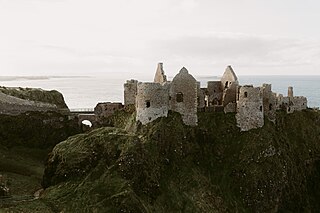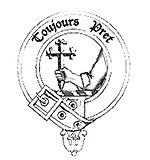Somhairle Buíodh MacDonnell, also spelt as MacDonald, was a Gaelic chief, the son of Alexander Carragh MacDonnell, 5th of Dunnyveg, of Dunyvaig Castle, lord of Islay and Cantire, and Catherine, daughter of the Lord of Ardnamurchan, both in Scotland. MacDonnell is best known for establishing the MacDonnell clan in Antrim, Ireland, and resisting the campaign of Shane O'Neill and the English crown to expel the clan from Ireland. Sorley Boy's connection to other Irish Roman Catholic lords was complicated, but also culturally and familiarly strong: for example, he married Mary O'Neill, the daughter of Conn O'Neill. He is also known in English as Somerled and Somerled of the yellow hair.

Clan Donald, also known as Clan MacDonald, is a Highland Scottish clan and one of the largest Scottish clans. The Lord Lyon King of Arms, the Scottish official with responsibility for regulating heraldry in that country, issuing new grants of coats of arms, and serving as the judge of the Court of the Lord Lyon, recognises under Scottish law the High Chief of Clan Donald. Historically the chiefs of the Clan Donald held the title of Lord of the Isles until 1493 and two of those chiefs also held the title of Earl of Ross until 1476. Queen Mary of Denmark is member of Clan Donald.
Alasdair Mac Colla Chiotaich MacDhòmhnaill, also known by the English variant of his name Sir Alexander MacDonald, was a military officer best known for his participation in the Wars of the Three Kingdoms, notably the Irish Confederate Wars and Montrose's Royalist campaign in Scotland during 1644–5. A member of the Gaelic gentry of the Clan MacDonald of Dunnyveg, a branch of the Clan Donald active in the Hebrides and Ireland, Mac Colla is particularly notable for the very large number of oral traditions and legends which his life inspired in the Highlands.

Randall MacDonnell, 1st Marquess of Antrim (1609–1683) was a Roman Catholic landed magnate in Scotland and Ireland, son of the 1st Earl of Antrim. He was also chief of Clan MacDonnell of Antrim. He is best known for his involvement, mostly on the Royalist side, in the Wars of the Three Kingdoms.

Dunluce Castle is a now-ruined medieval castle in Northern Ireland, the seat of Clan MacDonnell. It is located on the edge of a basalt outcropping in County Antrim, and is accessible via a bridge connecting it to the mainland. The castle is surrounded by extremely steep drops on either side, which may have been an important factor to the early Christians and Vikings who were drawn to this place where an early Irish fort once stood.
The Battle of Glentaisie, was an Irish battle fought in the north of Ulster on 2 May 1565. The result was a victory for Shane O'Neill over the Clan MacDonald of Dunnyveg. The conflict was a part of the political and military struggle, involving the English and occasionally the Scots, for control of northern Ireland. Although the MacDonalds were a Scottish family, based principally on the island of Islay in the Hebrides, they had long been associated with the Gaelic polity rather than the Kingdom of Scotland.

Clan MacDonald of Dunnyveg, also known as Clan Donald South, Clan Iain Mor, Clan MacDonald of Islay and Kintyre, MacDonalds of the Glens (Antrim) and sometimes referred to as MacDonnells, is a Scottish clan and a branch of Clan Donald. The founder of the MacDonalds of Dunnyveg is Eòin Mòr Tànaiste Mac Dhòmhnaill, a son of Iain Mic Dhòmhnaill and Margaret Stewart of Scotland, daughter of King Robert II. Members of the clan actually pronounced and spelled their name M'Connall due to the Gaelic pronunciation of the name Mac Domhnuill thus giving rise to the surname McConnell and its variants. While historically recognised as a clan by the Court of the Lord Lyon, it is now an armigerous clan as it no longer has a chief. The last chief was Sir James MacDonald, 9th of the Clan MacDonald of Dunnyveg or Clan Donald South, who died in London in 1626.
Coll Ciotach Mac Domhnaill (1570–1647) was a Scottish adventurer and mercenary of the Clan MacDonald of Dunnyveg branch of Clan Donald, who became Laird of Colonsay in 1623, by treachery. His name, which means "Coll the left-handed" or "the crafty", was anglicised as Colkitto. However he only used the nickname Ciotach late in his life in 1629 when it appeared in a Latin translation of a Gaelic letter where Coll refers to himself as "Ego Collatius Kiotach Macdonnell".
Events from the year 1558 in Ireland.
Somhairle Mac Domhnaill, called by English speakers Sorley McDonnell, was a renowned soldier for the Gaelic cause in Ireland and Scotland during the Thirty Years War and the patron who commissioned two 17th-century manuscript collections of poems, Duanaire Finn and The Book of O'Connor Donn.
Events from the year 1565 in Ireland.

Redshank was a nickname for Scottish mercenaries from the Highlands and Western Isles contracted to fight in Ireland; they were a prominent feature of Irish armies throughout the 16th century. They were called redshanks because they went dressed in plaids and waded bare-legged through rivers in the coldest weather. An alternative etymology, illustrated by Jamieson by a quote from Sir Walter Scott, is that it referred to the untanned deer leather buskins worn by Highlanders, although Jamieson notes that Scott's source, John Elder of Caithness, actually stated its origin was from their habit of going "bare-legged and bare-footed". The term was not derogatory, as the English were in general impressed with the redshanks' qualities as soldiers.
Colla MacDonnell was a son of Alexander MacDonnell, Lord of Islay and Kintyre (Cantire), and Catherine, daughter of the Lord of Ardnamurchan. He died at Kinbane Castle in 1558.

The Route was a medieval territory in Gaelic Ireland, located on the north-east coast of Ulster. It stretched between Coleraine and Ballycastle and as far south as the Clogh River. Originally part of Twescard, a county of the Earldom of Ulster, it was later ruled by the MacQuillans and then the MacDonnells.

Red Bay Castle is situated in County Antrim, Northern Ireland, on a headland projecting into the sea north of Glenariff situated on the road to Cushendall.
Clan MacAuley of the Glens was a small Irish clan that descend from south-western Scotland, who originally come over to Ulster to serve as galloglass mercenaries. They held lands in the Glens of Antrim in modern County Antrim and the chief was at one time known as Lord of the Glens. In 1559, the clan participated in the Battle of Aura, in which the McQuillans were defeated by the MacDonnells. The MacAuleys and MacPhoils arrived midway through the battle, and had planned on siding with the McQuillans and O'Neills, but the chief of the clan was persuaded by Sorley Boy MacDonnell to join forces with the MacDonnells.
James MacDonald, alias McDonnell, 6th Chief of Clan MacDonald of Dunnyveg, Scottish-Gaelic lord, died 1565.
Alexander Carragh MacDonnell, also spelt MacDonald, was the 5th lord of Dunnyveg, Scotland, alive c. 1480–1538.

The history of the Bissett family in Ireland can be studied independently from that of the originally identical family in Scotland, because of their unique experience following their arrival in Ulster in the early or mid-13th century. Here, while still remaining involved in Scottish affairs, the Bissetts would establish themselves as the Lords of the Glens of Antrim and quickly become equally, then eventually more involved in the politics of the Irish province, becoming among the most Gaelicised of all the so-called Anglo-Norman families in Ireland. The heads of the leading branch of the family soon adopted the Gaelic lineage style Mac Eoin Bissett, by which they are known in the Irish annals, and which translates as "Son/Descendant of John Byset", after a prominent ancestor born in Scotland. In a number of English and Anglo-Norman sources the same head of the family is referred to as the Baron Bissett, also with variants.
Donald Balloch MacDonald Scottish-Gaelic lord, died about 1476.








